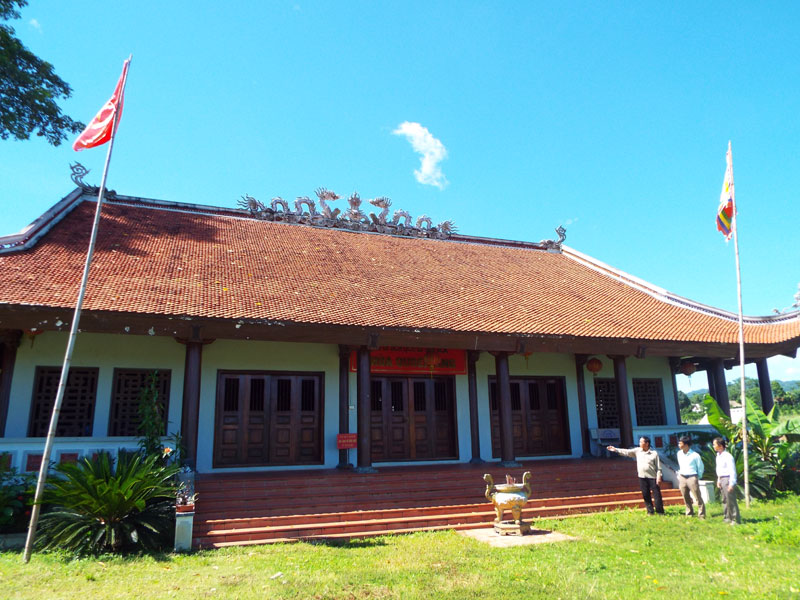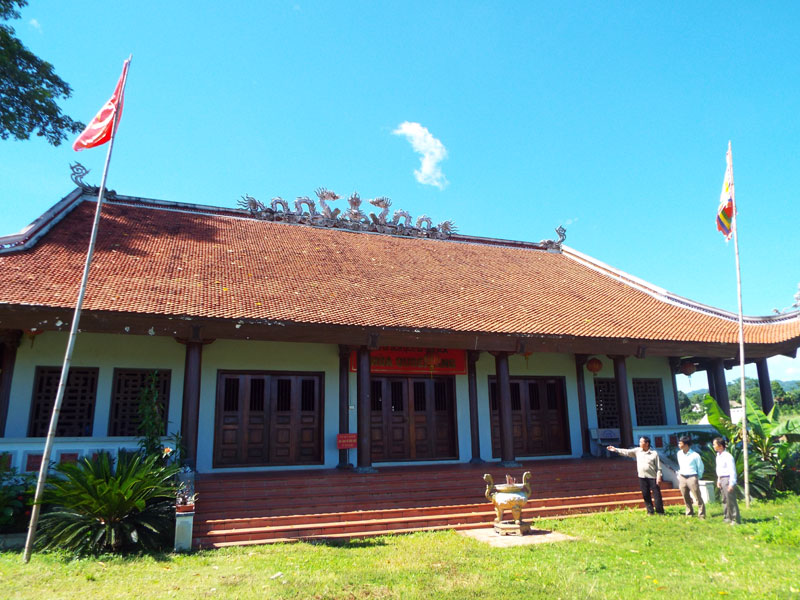
(HBO) – In autumn days of August, we had an occasion to visit the Cao Phong – Thach Yen revolutionary base. Following the historical traces, we relived the old revolutionary days. The Cao Phong – Thach Yen land formerly had rough mountainous terrain.
In late 1944, the regional party committee of
Bac
Kyassigned comrade Vu Tho, former Secretary of the Party delegation of Hoa Binh,
to come to the region to popularize the nation’s revolution among ethnic people
there, which paved a way for the establishment of the Cao Phong – Thach Yen
revolutionary base. In July 1945, Vu Tho selected 30 young, tough and
enthusiastic militiamen for military training courses in Cao Phong – Thach Yen
region. At first, the classes were located at Ngai hamlet, Thach Yen commune
(now Yen Lap commune), and then removed to Khanh pagoda, Thach Yen commune (now
Yen Thuong commune).

Quoen Ang
pagoda site in Tan Phong commune was upgraded to satisfy the spiritual demand
and educate revolutionary tradition for today young generations.
Quoen pagoda in Trang hamlet, Tan Phong commune,
was the gathering of the Hoa Binh Party delegation in April 1945. During the
meeting, the Party delegation decided to establish revolutionary bases. On August
23, 1945, the delegation of Cao Phong – Thach Yen base coordinated with the
army in Lac Son to enter Phuong Lam, then crossing the Da River to
Dung street to join
revolutionary forces in the whole province to seize the power.
While visiting Quoen Ang pagoda relic site, Bui
Van Yen, Chairman of Tan Phong commune’s People’s Committee shared that after
the anti-France resistance war, the pagoda was damaged due to many reasons. On
the land of the old pagoda, there were only a few of broken tiles. The only
object found at the pagoda is a bronze bell weighing over 100kg and dating to
the 18th century. In 2012, one billion VND was invested in upgrading the pagoda
relic site to meet the spiritual life and educate revolutionary history for
young generations today. Along with Khanh pagoda, Quoen Ang is a popular place
for spiritual tourism, attracting a lot of tourists on Tet holidays. Promoting
the tradition of the revolutionary land, officials and residents in Tan Phong
commune have spared no effort to overcome difficulties and build a new life. In
2017, the commune strives to increase annual per capita average income to 28
million VND. The rate of poor households will be reduced by 17.2 percent.
Currently, the commune has met 15 out of the 19 criteria on building new-style
rural areas.
The Thach Yen – Cao Phong base was recognised as
a national revolutionary relic site by the Ministry of Culture and Information in
1996. Nowadays, not only Tan Phong commune, but also other mountainous communes
such as Yen Lap and Yen Thuong are witnessing day-by-day changes. Thanks to the
Party and State’s support, the infrastructure at these communes has been
improved, bringing a facelift to the land. Local people are excited to join
labour production and build a well-off life.
The emulation movement "Hoa Binh joining hands to build new-style rural areas” has been widely spreading, becoming a driving force that motivates the localities to renew rural landscapes and improve the material and spiritual lives of the residents. In this movement, the people play a central role-both as the main implementers and direct beneficiaries of its outcomes.
In response to the global digital revolution, Hoa Binh Newspaper is transforming itself into a modern and multi-platform media hub, blending cutting-edge technology with a restructured newsroom and a new generation of tech-savvy journalists.
Hoa Binh province’s Association of the Elderly recently held a conference to review the project on expanding the inter-generation self-help club model until 2025.
In a move to implement Resolution No. 57-NQ/TW, issued on December 22, 2024 by the Politburo, which targets breakthroughs in science-technology development, innovation, and digital transformation, the Hoa Binh provincial Department of Health has issued a plan to roll out the "Digital Literacy for All” campaign within the local health sector.
An Nghia Commune (Lạc Sơn District) is one of the communes that achieved the tha standard of the national new rural area in 2018. Entering a new development phase, the commune is now trying to meet the criteria for the advanced new rural development. With the strong political will and the public consensus, the commune is gradually overcoming the challenges to reach this goal, aiming for the sustainable development.



